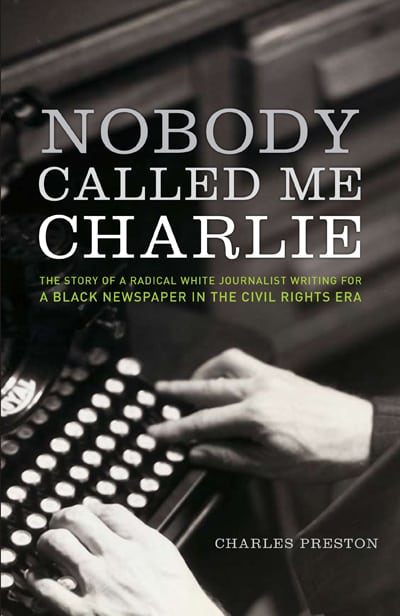Nobody Called Me Charlie: The Story of a Radical White Journalist Writing for a Black Newspaper in the Civil Rights Era
$21.95
In the 1940s, at the height of segregation, Charles Preston became the unlikely newest worker at a black owned-and-operated newspaper. Preston, a white man and, unbeknownst to most of his colleagues, member of the Communist Party, quickly came face to face with issues of race and injustice that would profoundly impact his life and change the way he understood society in the United States.
This fictionalized account of his experience tells readers what it was like to be the only white worker, and a communist at that, at a black newspaper, while unflinchingly depicting the racism that was so common and accepted in the 1950s. This book draws us into a world few white people knew about, not in a voyeuristic but in a deeply human way. The quotidian elements of daily life—at work, at home, in the neighborhood—are described with humor and pathos, but this account rises above mere anecdote. It takes on the central question of this nation’s history: can a truly human and humane society be built on a foundation of profound and pervasive racial inequality? Of course, the answer is no.
Yet how do we make such a society? Or put another way, how must white people try to live their lives and how must they connect with their black brothers and sisters, personally and politically, to make a world in which the horrible scars of racism are healed once and for all? The answer that shines through Preston’s book—whether he is writing (and reporting) about work, local politics, the civil rights struggle, housing, education, entertainment, travel, sports, business, child-rearing, friendship, or intimate relationships—is that whites must do what he did: give up their whiteness. This is a book you will not forget.
For people interested in a hard-bitten first-hand account of racism, radicalism, and the media, I couldn’t recommend a better book. For aspiring sports writers, the sections on Preston’s efforts to apply his politics to the sports page should be must-reading in every sports journalism program in the country. This is hidden history at its finest.
—Dave Zirin, author of A People’s History of Sports in the United States
When Charles Preston crossed America’s color line after World War II, his journey took him on a path few had traveled. A white man and a communist, he went to work for a black newspaper in Indianapolis during the 1940s, when integration began changing the country. His memoir offers a fascinating and rare perspective on African American society, blending insight with a sense of life’s daily intimacies.
—Robert Ruck, Senior Lecturer, Department of History, University of Pittsburgh
Author of Sandlot Seasons: Sport in Black Pittsburgh
Charles S. Preston was born in 1911 and grew up in the small town of Anderson, Indiana. Radicalized by the events of the Great Depression, he and his wife Lucy joined the Communist Party in New York City. In 1943, they and their young son Gregor moved to Indianapolis, where Charles went to work for the Indianapolis Recorder, the nation’s third oldest black newspaper. He worked there until the 1960s, gaining the rich experiences that are the basis of this book. He spent most of the rest of his life as a journalist, his commitments to socialism and racial solidarity undiminished.
Publication Date: January 2010
Number of Pages: 304
Cloth ISBN: 9781583672020
Related products
-
Monthly Review Volume 2, Number 10 (February 1951) [PDF]
$10.00 Add to cart -
Monthly Review Volume 2, Number 7 (November 1950) [PDF]
$10.00 Add to cart -
Monthly Review Volume 2, Number 6 (October 1950) [PDF]
$10.00 Add to cart -
Monthly Review Volume 2, Number 3 (July 1950) [PDF]
$10.00 Add to cart -
Monthly Review Volume 1, Number 6 (October 1949) [PDF]
$10.00 Add to cart -
Monthly Review Volume 1, Number 2 (June 1949) [PDF]
$10.00 Add to cart

![Monthly Review Volume 2, Number 10 (February 1951) [PDF]](https://monthlyreview.org/wp-content/uploads/2015/09/Monthly Review Volume 2, Number 10 (February 1951) [PDF].jpg)
![Monthly Review Volume 2, Number 7 (November 1950) [PDF]](https://monthlyreview.org/wp-content/uploads/2015/09/Monthly Review Volume 2, Number 7 (November 1950) [PDF].jpg)
![Monthly Review Volume 2, Number 6 (October 1950) [PDF]](https://monthlyreview.org/wp-content/uploads/2015/09/Monthly Review Volume 2, Number 6 (October 1950) [PDF].jpg)
![Monthly Review Volume 2, Number 3 (July 1950) [PDF]](https://monthlyreview.org/wp-content/uploads/2015/09/Monthly Review Volume 2, Number 3 (July 1950) [PDF].jpg)
![Monthly Review Volume 1, Number 6 (October 1949) [PDF]](https://monthlyreview.org/wp-content/uploads/2015/09/Monthly Review Volume 1, Number 6 (October 1949) [PDF].jpg)
![Monthly Review Volume 1, Number 2 (June 1949) [PDF]](https://monthlyreview.org/wp-content/uploads/2015/09/Monthly Review Volume 1, Number 2 (June 1949) [PDF].jpg)